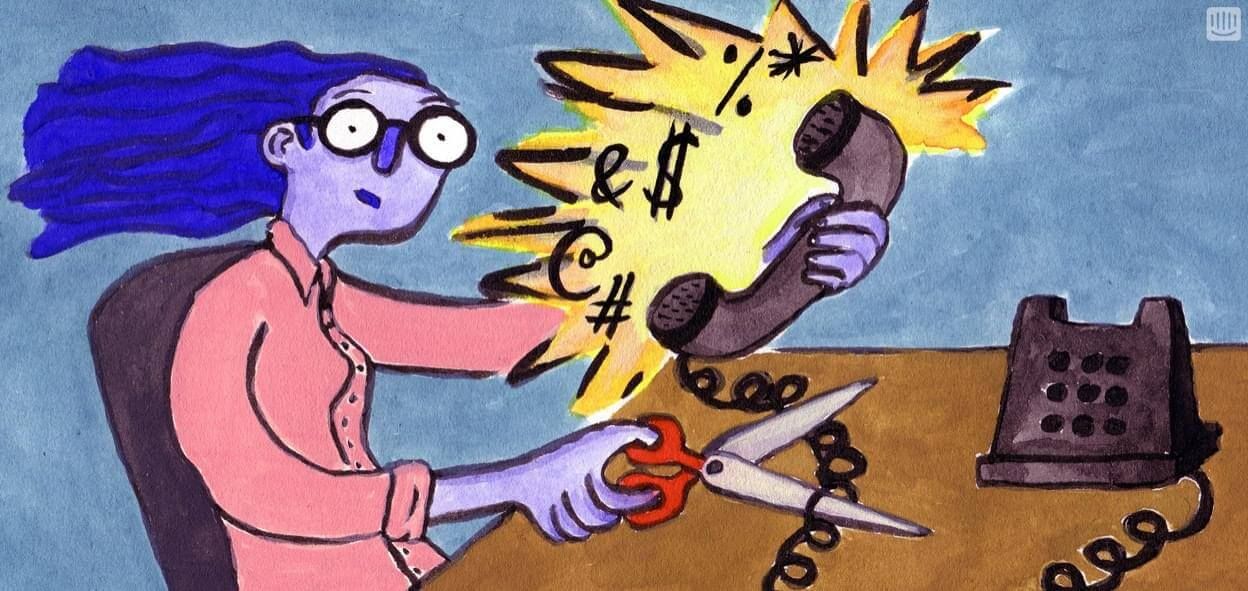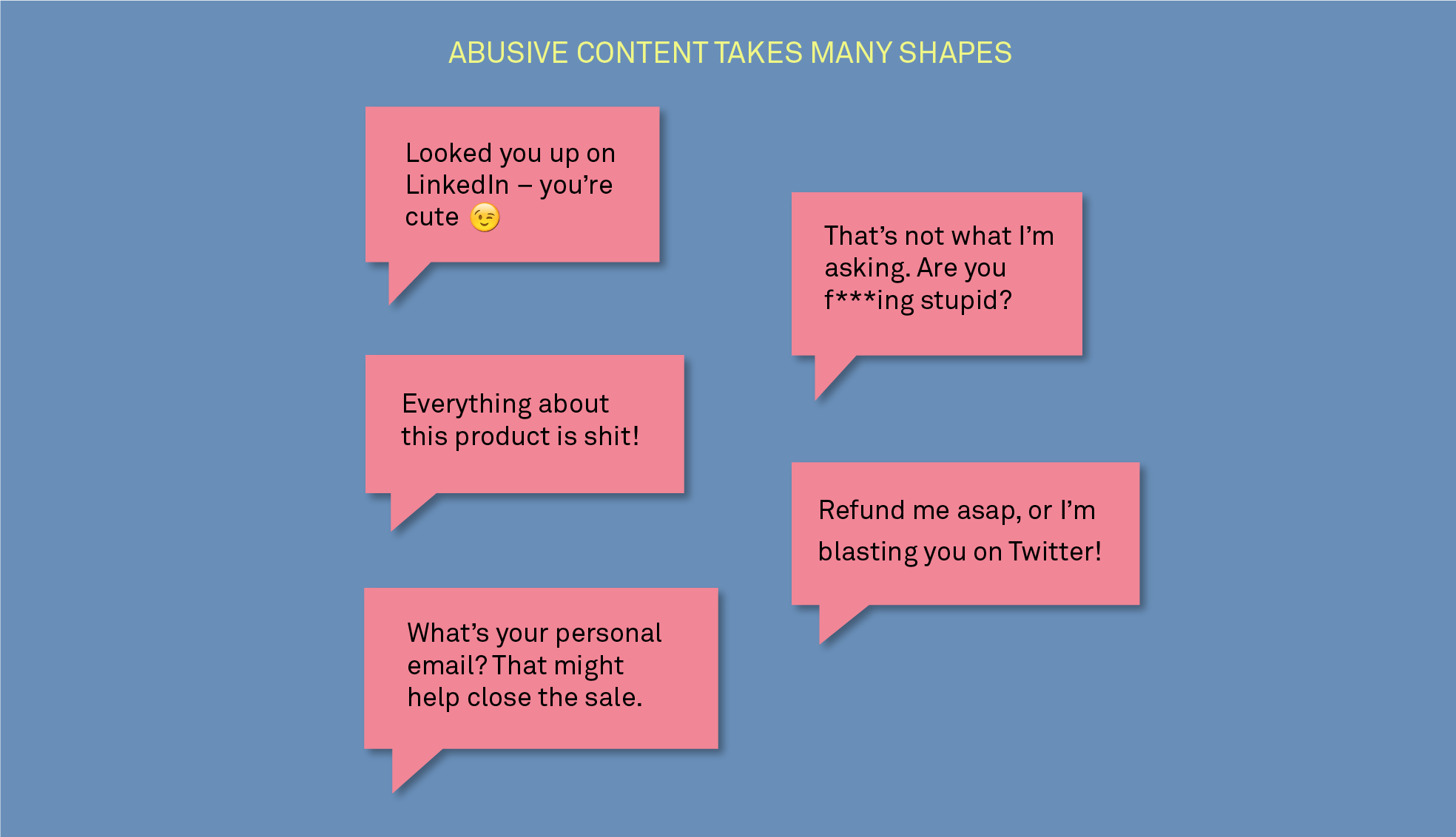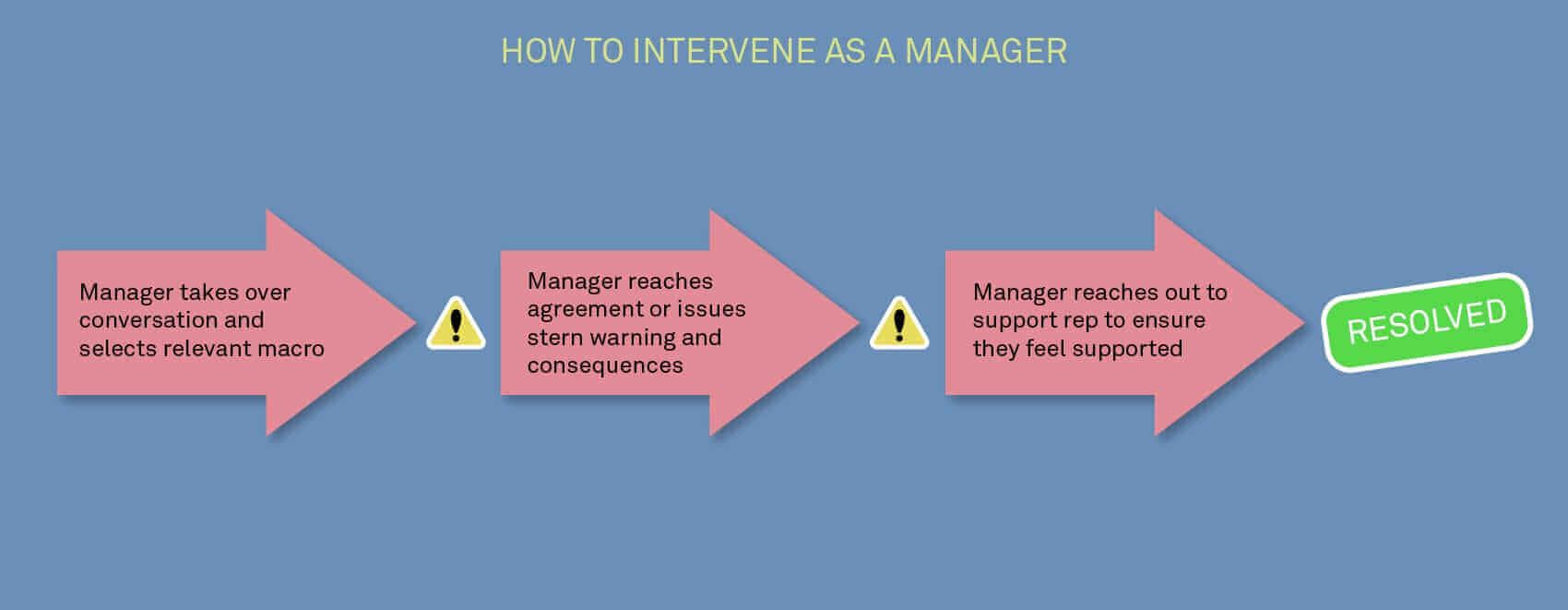
Cutting the cord on inappropriate customer conversations
Main illustration: Hallie Bateman
At Intercom, we support our customers through conversational, messenger-based support. Supporting our customers primarily through our Business Messenger has many advantages, such as helping us build personal relationships with our customers and providing them with the fast, meaningful resolutions they need.
But sadly, and inevitably, there will be people who abuse their access to your team. You can’t put a price on knowing how to react responsibly. Both support managers and reps need to be prepared for how to swiftly deal with this behavior.
One of our Customer Support Specialists, Christina, works relentlessly on supporting our customers day in and day out, helping them find the answers to their complex questions and at times unique requests. In her time in support, she’s noticed that occasionally even long-term customers can become inappropriate. This can leave support reps feeling unsure of what to do and what to say. Worst still, it can make them feel unsafe. As Christina tells it:
Working in support can bring a whirlwind of emotions. A customer making me feel uncomfortable is not something I wanted to experience.
The very first time I encountered an unwanted comment from a customer, it brought me to a complete halt. He referred to “how lucky Dublin is” to have someone like me and said he would love to meet up someday. My heart pounded. My whole body tensed up. I tried to shrug it off – be tough and resilient, behave like nothing untoward had happened.
And then my mind went into overdrive: “but we’re in work”, “this is a professional setting”, “how could he say that to me?” I wondered what I had done to deserve this. Was my picture too inviting? Did my language come across as flirting?
Anyone who is a target of such unwanted attention knows how miserable it can make you feel. You can experience a range of detrimental outcomes, such as impaired cognitive performance, feelings of body shame, and anxiety. I was too scared to tell someone what had happened, never mind reveal how I felt.
No support leader ever wants a member of their team to feel like this. But when customers cross the line of appropriateness, it can leave both support managers and reps unsure of the best path to take to resolve the situation. At Intercom, Christina’s experience inspired us to create a robust process that relieves the emotional burden on our team to figure out what steps to take and where to seek help.
What is inappropriate/abusive customer behavior?
If you’ve never worked in frontline sales or support, or if your front-facing dealings have been limited you may not know this happens. It’s easy to think of tough customer conversations solely being based around them being angry or having to say no. Inappropriate or abusive behavior is different to anger. It ranges from short personal comments, to abuse, to borderline harassment. We’ve seen “Hi gorgeous!” to “You’re a f****** idiot!” all the way up to sexually explicit photographs.

Non signed-in visitors are more likely to act in this manner because they benefit from anonymity. There’s no name, photo, or email address attached to their conversation. We witnessed snippets of this coming into our Inbox from people who chose not to leave an email address – occasionally they sent selfies, strange pictures, GIFs, or outright creepy comments. As these were random people from the internet, we couldn’t control this incoming content. But we could (and were determined to) control how we reacted to it and supported our team.
Empowering your team with a robust process
When a support rep experiences inappropriate behavior, it can understandably be difficult to figure out what to do or where to go for help in the moment. That’s why it’s important to empower your team with a clear, consistent process.
At Intercom, after multiple meetings spent discussing the best possible approach, we settled on a process that addresses all of the main issues we’ve experienced before. The new process creates a private space where very little needs to be said or explained by the person experiencing the abuse or inappropriate comments. Here’s how it works.
Equip your team with pre-written responses
The first step toward eliminating ambiguity is to set up the right workflows and create pre-written responses called “macros”.
Today, at Intercom, if a support rep experiences an inappropriate comment – anything ranging from, “You’re so beautiful” to “I don’t know how anybody does any work around you” – they can immediately respond with a pre-prepared macro approved by our legal team with the intention of de-escalating the situation. The macro also warns the customer that this is a professional relationship and draws their attention to our Acceptable Use Policy. We’ve made this pre-written response available for all of our support staff to use.
“A specific tag called ‘Abusive Customer’ automatically triggers a notification and a warning prompting the management team on call to take over the conversation”
If the situation escalates further, all that a support rep needs to do is tag the conversation with a specific tag called “Abusive Customer” which automatically triggers a notification and a warning prompting the management team on call to take over the conversation.
Offer emotional support
Next, you’ll want to ensure your team feels fully supported and safe – not just physically, but also emotionally and psychologically.
At Intercom, in instances where a conversation escalates and a macro doesn’t resolve it, support managers are given strict guidelines to immediately take over the conversation and make sure that the support rep is okay after receiving an out-of-line message. This is always done in a private conversation, where the manager outlines all of the available support options, including our Employee Assistance Program and a secure third-party platform where they can share anonymous reports, feedback about culture issues, harassment, bias, or anything else they’ve experienced.
The key to building trust with your team is never to ignore the situation or laugh it off. Confront it head on, take it seriously, and let them know you’re there for them.
Dealing with inappropriate or abusive conversations could lead to a different judgment call every time. Not every customer reacts the same way to being called out. But as a manager, remember every teammate deserves to feel valued and respected.
Confronting a customer as a manager
Of course, it’s not just support reps who need a robust process and support system. You’ll want to ensure your management team up is set up for success as well.
At Intercom, we’ve created more than five different macros managers can choose from depending on the situation and how a conversation with the customer might progress. Each response has been approved by our legal team and the wording is clear and strict, outlining all of the potential consequences the customer could face if they continue pursuing harmful words and/or actions.
“Our employees, their mental health, and psychological safety always come first”
Some potential outcomes of inappropriate customer behavior range from providing a simple warning about blocking a user to pausing or even completely cancelling a subscription. Because believe it or not, sometimes customers, even if rarely, are not always right. Our employees, their mental health, and psychological safety always come first.

Always put your team first
Inappropriate comments can hurt employees on a deeply personal level and impact their potential to lead a fulfilled work life. And that’s never okay.
As leaders we have a duty of care to our people. A frontline team who sees that their manager and company care more about their wellness than an inappropriate customer’s revenue will feel valued and more motivated by their work.
Showing your support team how important they are is key to their happiness and productivity. Place your people first and the rest will follow.









